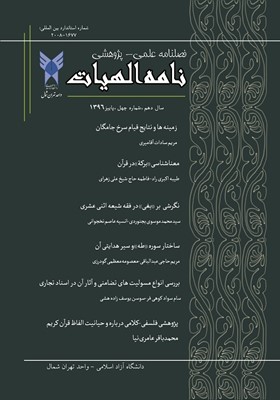پارادایم عدالت ترمیمی و تحدید میانجیگری کیفری در فقه و حقوق ایران
محورهای موضوعی : نامه الهیات
1 - دانش آموخنه دکتری فقه و مبانی حقوق اسلامی، واحد تهران شمال، دانشگاه آزاد اسلامی، تهران، ایران.
کلید واژه: عدالت کیفری, عدالت ترمیمی, میانجیگری, اصلاح ذات البین,
چکیده مقاله :
عدالت ترمیمی نتیجه تحولات بوجود آمده در نگرش به عدالت کیفری می باشد، این فرایند با ابزارهایی چون میانجیگری اختلاف را در محیطی دوستانه با مشارکت بزه دیده و متهم با مدیریت شخص ثالث و یا گفتگو در خصوص علل، آثار و نتایج جرم انتسابی، روند حل و فصل را تسهیل می بخشد. این روش علاوه براینکه از تراکم کار و اطاله دادرسی که حاکم بر نظام قضایی شده می کاهد، بلکه منجر به پیشگیری و کاهش تخلفات در بلند مدت و پرورش سیستم قضایی مطلوب می گردد. پژوهش حاضر درصدد است که بصورت توصیفی، تحلیلی به دنبال پاسخ به این پرسش باشد که تحدید فقهی، حقوقی میانجیگری شامل چه جرایمی می شود؟ یافته های پژوهش نشان می دهد هیچ گونه محدودیتی در شرع برای ارجاع جرایم حق الناس به میانجیگری وجود ندارد و در جرایم حق الله نیز که حاکم دارای اختیار عفو بوده و یا با اقرار بزهکار جرم اثبات شده است و نیز درصورت توبه، قبل از رسیدن جرم نزد امام و قبل از اقامه بینه ارجاع به میانجیگری جایز است.در حالی که مقنن در ماده 82 قانون آیین دادرسی کیفری تحدید توسل به میانجیگری را فقط در جرایم تعزیری با درجات 6 و 7 و 8 قرار داده، به این معنا که شامل جرایم حدی، دیات و قصاص که حق اولیای دم است، نمی شود. بنابراین قانون گذار می بایست بازنگری هایی جدی در جهت وسعت قلمرو ارجاع دعاوی به میانجیگری را انجام دهد.
Restorative justice is the result of changes in the attitude towards criminal justice, this process is a resolution process with tools such as mediation of the dispute in a friendly environment with the participation of the victim and the accused with the management of a third party or discussion about the causes, effects and results of the attributed crime. and facilitates the season. This method not only reduces the density of work and the delay of proceedings that dominates the judicial system, but also leads to the prevention and reduction of violations in the long term and the development of a favorable judicial system. The current research is trying to find an answer to this question in a descriptive and analytical way, what crimes does the jurisprudential and legal limitation of mediation include? The findings of the research show that there are no restrictions in the Sharia for referring human rights crimes to mediation, and in the cases of God's rights crimes, where the ruler has the power to pardon or the crime is proven by the confession of the guilty, and in case of repentance, before the crime is committed. According to the imam, it is permissible to refer to mediation before the establishment of evidence. While the legislator in Article 82 of the Criminal Procedure Law has limited the use of mediation only in taziri crimes with degrees 6, 7 and 8, in the sense that it includes limited.
_||_

